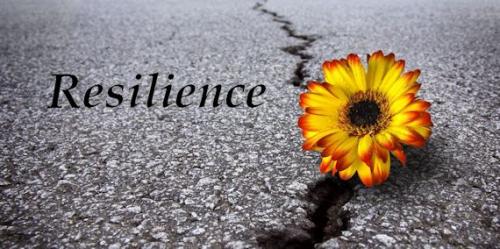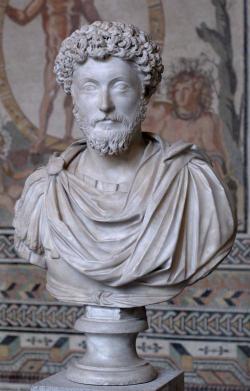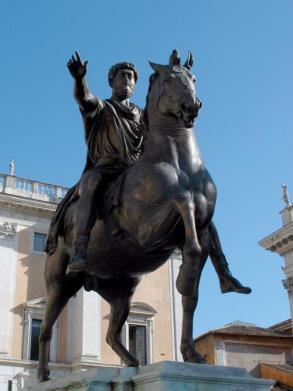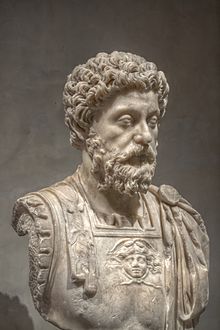Resilience: How The Stoic Marcus Aurelius Could Strenghten Our Will And Mind 3/4

Hello, dear friends. Welcome to Part Three.
I find the teachings of Stoicism a great help in strengthening my ptsd-scrambled brain. It has been universally beneficial to regular folks for 2,500 years now.
You may find it a useful, practical guide to strengthen your mind in these turbulent times.
Previously, I had written a 3-part essay series on the Stoic teachings of the Roman Epictetus that makes for a brief grounding in Stoic practical basics. You will find it in the Resilience Group Essay Queue:
http://caucus99percent.com/content/stoicism-trauma-survivors-part-13
This is a four-part series on the thoughts to himself of the Roman Stoic, Marcus Aurelius, emperor of Rome.
I present an introduction on what Aurelius means to me, who he was, and then his thoughts without comment: for they speak clearly for themselves directly to the reader. More below.
Japanese Zen Garden meditative music goes (un)surprisingly well with reflection on the sayings of Marcus Aurelius - the emperor at war, alone in his commander's tent at night on the frontier.
Introduction: How Marcus Aurelius Helped Me
My Loeb edition of The Meditations is dog-eared and filled with pencil markings from long hours of studying during quiet times on military exercises and deployment.
The growing ptsd steadily overwrote the coding and chemical channels within my brain structures.
I had no understanding of what was happening within me: only growing "irrational" anger, "weird" new paranoia, psychotic breaks, and growing dread, night terrors, and daily anxieties.
I tried, unsuccessfully, to hide my problems with the usual result of alienating everyone.
I should have crashed much earlier. I am still awed by the strength of will that kept me going, one foot in front of the other, form break to break, from day to night and night to day.
Stoicism steeled the will inside of me; I literally experienced the blacksmith's sword forging processes -
the fire, the water, the blows from the hammer on the anvil, the fire, the water, the blows, every day.

I carried my paperback Stoic books in my gear or my webbing. I read them everywhere on breaks.
Because they helped me endure.
Once before a month-long exercise, which consisted mostly of digging armoured vehicles out of spring-time mud, I took the online George Long translation and copied my favourite sayings into a Word document.
This I carried in my trouser side pocket in a plastic bag and read when I felt overwhelmed.
I'm using that to share with you, hoping it could help you strengthen your mind during trying times.
Then, I learned that Aaron Beck and Albert Ellis both based cognitive-behavioural therapy on the Roman Stoics. And I went to the doctors to get help.
I've been in CBT therapy (with competent and incompetent psychologists) for ten years now.
I got the help I needed, but lost my military career to a medical release.
My diagnosis is complex and chronic. I will need CBT and Stoicism for the rest of my life.
And I am grateful for both for they saved my life, marriage, and family.
The Life of Marcus Aurelius

(The only reason this statue survived was because the heathen Christians thought it was of their Emperor Constantine!)
The life of Aurelius was fascinating and you can read about in online. Here's just the header info from wiki:
Marcus Aurelius26 April 121 – 17 March 180 AD) was Roman Emperor from 161 to 180. He ruled with Lucius Verus as co-emperor from 161 until Verus' death in 169. He was the last of the Five Good Emperors, and is also considered one of the most important Stoic philosophers.
During his reign, the Empire defeated a revitalized Parthian Empire in the East: Aurelius' general Avidius Cassius sacked the capital Ctesiphon in 164. In central Europe, Aurelius fought the Marcomanni, Quadi, and Sarmatians with success during the Marcomannic Wars, although the threat of the Germanic tribes began to represent a troubling reality for the Empire. A revolt in the East led by Avidius Cassius failed to gain momentum and was suppressed immediately.
Marcus Aurelius' Meditations, written in Greek while on campaign between 170 and 180, are still revered as a literary monument to a philosophy of service and duty, describing how to find and preserve equanimity in the midst of conflict by following nature as a source of guidance and inspiration.
https://en.wikipedia.org/wiki/Marcus_Aurelius
Selections from The Meditations of Marcus Aurelius

Reverence the gods, and help men. Short is life. There is only one fruit of this terrene life, a pious disposition and social acts. VI.30
He who has seen present things has seen all, both everything which has taken place from all eternity and everything which will be for time without end; for all things are of one kin and of one form. VI.37
It is within our power to have no opinion about a thing, and not to be disturbed in our soul, for things themselves have no natural power to form our judgments. VI.52
To the jaundiced eye honey tastes bitter, and to those bitten by mad dogs water causes fear, and to little children the ball is a fine thing. Why then am I angry? Do you think that a false opinion has less power than the bile in the jaundiced or the poison in him who is bitten by a mad dog? VI.57
No man will hinder you from living according to the reason of your own nature: nothing will happen to you contrary to the reason of the universal nature. VI.58
To recover your life is in your power. VII.2
Every man is worth just so much as the things are worth about which he busies himself. VII.3
All things are implicated with one another, and the bond is holy. VII.9
Everything material soon disappears in the substance of the whole, and everything formal (causal) is very soon taken back into the universal reason; and the memory of everything is very soon overwhelmed in time. VII.10
Is any man afraid of change? Why, what can take place without change? What then is more pleasing or more suitable to the universal nature? And can you take a bath unless the wood undergoes a change? And can you be nourished unless the food undergoes a change? And can anything else that is useful be accomplished without a change? Do you not see then that for yourself also to change is just the same, and equally necessary for the universal nature. VII.18
The universal nature out of the universal substance, as if it were wax, now moulds a horse, and when it has broken this up, it uses the material for a tree, then for a man, then for something else; and each of these things subsists for a very short time. But it is no hardship for the vessel to be broken up, just as there was none in its being fastened together. VII.23
Retire into yourself. VII.28
Wipe out the imagination. Stop the pulling of the strings. Confine yourself to the present. Understand well what happens either to you or to another. Divide and distribute every object into the causal (formal) and the material. Think of your last hour. Let the wrong which is done by a man stay there where the wrong was done. VII.29
Adorn yourself with simplicity and modesty and with indifference towards the things which lie between virtue and vice. VII.31
Love mankind. Follow God. VII.31
No joining others in their wailing, no violent emotion. VII.43
Look within. Within is the fountain of good, and it will ever bubble up, if you will ever dig. VII.59
The art of life is more like the wrestler’s art than the dancer’s, in respect of this, that it should stand ready and firm to meet onsets which are sudden and unexpected. VII.61
In every pain, let this thought be present, that there is no dishonour in it, nor does it make the governing intelligence worse, for it does not damage the intelligence either so far as the intelligence is rational or so far as it is social. Indeed in the case of most pains let this remark of Epicurus aid you, that pain is neither intolerable nor everlasting, if you bear in mind that it h as its limits, and if you add nothing to it in imagination. VII.64
Part Two is here: http://caucus99percent.com/content/resilience-how-stoic-marcus-aurelius-...
I look forward to your comments and reflections.
Peace be with us, if we learn to strengthen our minds,
gerrit


Comments
Hi, Gerrit, about Marcus Aurelius,
personally I haven't faced anything as tough as you have described. Yet at one point a few years back, when I happened to be going down a vortex to personal hell, my thoughts turned to him as well. Found him in English transation at Barnes & Noble. I love that you carried the Loeb edition with you through all that. And your writing is deeply eloquent. What to say when a "hat tip" is inadequate and a handshake or hug impossible? Thanks for your work.
I'd like to do something to help the Resilience group. Realistically, I'm already employed in a writing field part time, otherwise mostly use a tablet for communcation, and want to avoid letting anyone down. Any thoughts?
Euterpe2
Thank you, Euterpre2, my friend, it's good to know Aurelius has
helped others along the way. And personal hell is personal hell, eh. How one ends up in a personal hell is less relevant. There's folks who go through worse and just shake it off. But hell is hell. And I am so glad that he helps you like he did me.
We'd love for you to write resilience posts! Write on what you love and whenever you feel like it and have the time. There's no commitment needed. We'll be delighted with posts from you when and where you find time. Write whenever you wish. Add the word "resilience" in the tags. Add the flower photo: it's called "Resilience1.jpg" in the photo browser thingy. And that's all that's needed :=)
No pressure, my friend. Anything anytime will be welcome :=) Thank you for thinking about it.
Resilience: practical action to improve things we can control.
3D+: developing language for postmodern spirituality.